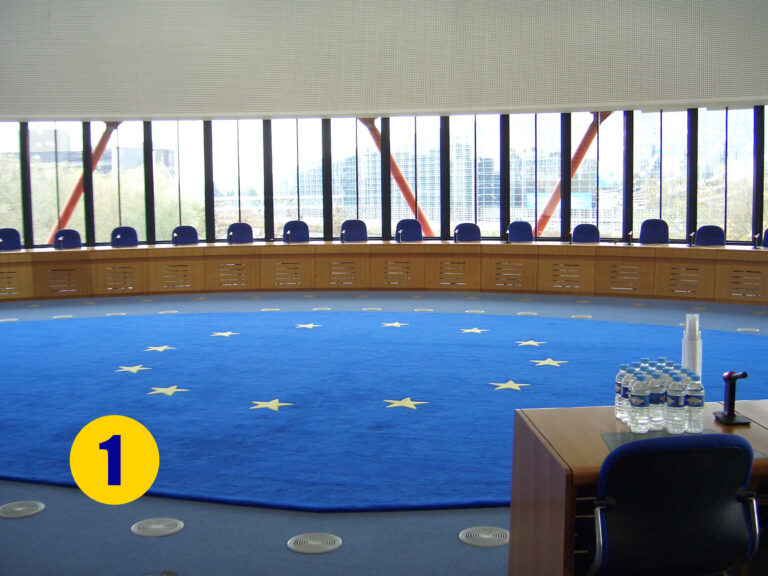Human Rights
One of the most divisive pre-election themes was the insistence by some Conservative MPs that the UK needed to leave the European Convention on Human Rights (ECHR). The demand was the inevitable consequence of the years our politicians spent fighting ‘lefty’ lawyers who were determined to use the ECHR to prevent the deportation of migrants, which eventually resulted in the failure of the Rwanda plan. I feel that the desire to pull out was also bolstered by the presence of the ‘E’ in ECHR. But maybe I’m wrong about that.
The concept of Human Rights allows us to discriminate between refugees with a genuine case for asylum, whether or not they have been trafficked, and those who wish to enter the country for economic or social reasons.
With a former human rights lawyer now leading a far more stable government, the distinction has been settled, at least for now. This creates a less politicised space to consider the concept of human rights from a biblical perspective. I’m pleased the Rwanda plan has been neutered, but remain unsure whether the concept of human rights is a moral good or a logical cul-de-sac.
Let’s begin with reflecting on what it means to be Human:
However we understand the creation stories, Christians who believe in a God who is involved with the world are united in the conviction that humans are not accidents. Whether we are created, were designed, and/or have evolved doesn’t matter. We have value, and our value is derived from the one who created/designed/allowed us to live and flourish. Added to this is the idea that we bear some kind of image of our creator.
The meaning of ‘Image’ has been interpreted in various ways, often reflecting the presuppositions of the age. From the enlightenment to the early decades of the 20th century the general mood was one of optimism: the progress myth was in full spate, and the general assumption was that education, economic power and personal freedom would guarantee unlimited benefits to humankind. Humans created in God’s Image were co-creators, tamers of wild forces and designers of utopian futures. Such positivism was underpinned by a Post-Millennial theology which confidently asserted that Christ would return to a world that had been perfected by those he had placed at the pinnacle of his creation.*
The first small hole in the positivist/post-millennial bubble was made between 1914 and 1918. More holes appeared following the economic crash of the 1930s which became the incubator for the multitude of forces that led to the second world war. The world has seen countless positive developments in the decades since, and human ingenuity still seems to know no bounds, but the spirit of the age has changed. We have been forced to accept there are finite limits to natural resources, and therefore to our ability to generate power, grow food and keep the whole of the world’s population fed and hydrated. Where there is tension between priorities, as always, the poor suffer first.
The concept of Image has always been richer than any single idea that appeals to the dominant culture. There are other definitions of Image that are great deal more holistic, including, for example, an innate capacity to relate to God, ourselves (psychically), each other and nature, and we are invited to grapple with the idea that God relates to us through the presence of a crucified Christ who identifies and suffers with us.
Scripturally, Image is the logical foundation of Paul’s insistence that there is no difference in value between male and female, slave or free, between different races and those with who believe different theologies or have none at all. The church, in the first few centuries of its existence, grew and was also fiercely persecuted because it lived differently to the often brutal, and distinctly hierarchical, society around it. Yet all they were doing was seeking to live out Jesus’ command to offer everything that bears the Image of the creator back to him.
So when, following the utter devastation of Europe during the war years, the UK was the first signatory to “a Charter…guaranteeing liberty of thought, assembly and expression as well as the right to form political opposition” and to “a Court of Justice with adequate sanctions for the implementation of this Charter” how can anyone who believes that humans are created in God’s Image doubt the wisdom of beginning down such a path?
Let me be clear at the end of this first post – I believe the ECHR to be the product of laudable aims and I accept that it has played a very important role, not just in righting wrongs, but also in restricting inhuman behaviour. It may be the best that can be achieved in a continent that does not embrace – and why should it? – the Christian doctrine of Image as a fundamental definer of human value. I also have no political axe to grind – I believe we should be treating migrants more kindly and justly and I have very limited patience with those who wished to leave the ECHR so we could deport precious humans seeking refuge in a safer country.
I suspect that the establishment of the ECHR by a generation that had lost its faith both in God and humanity was a quasi-religious attempt to invent a secular alternative. For this reason, maybe the current doctrine of Human Rights is the best society can do.
But is it the best Christians can do? Read on…
* My issue with Post-Millennial theology, and all its alternatives, is that I believe it is a mistake to read the Book of Revelation as primarily about the end of the world. I do all I can to resist the human bias toward making everything all about ME and all about NOW.


